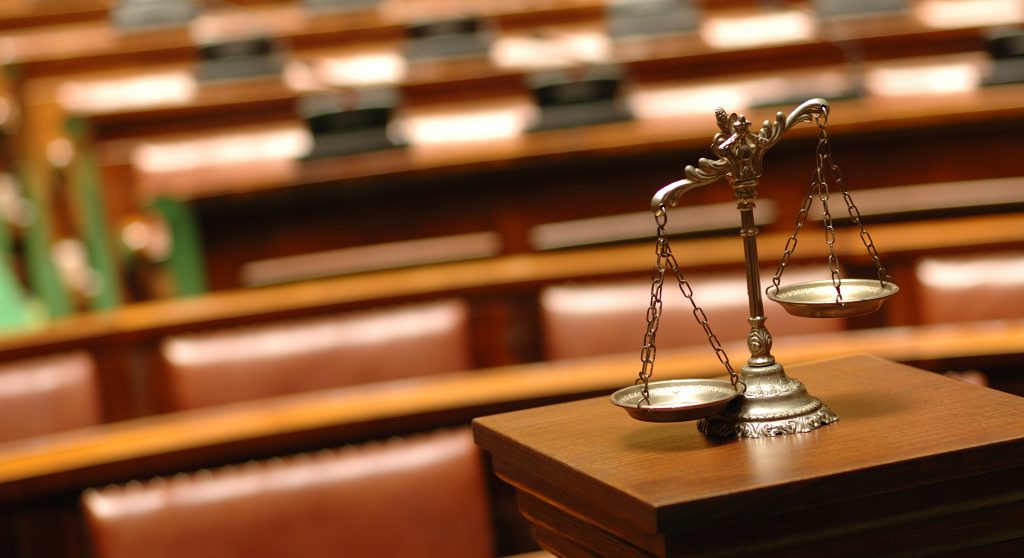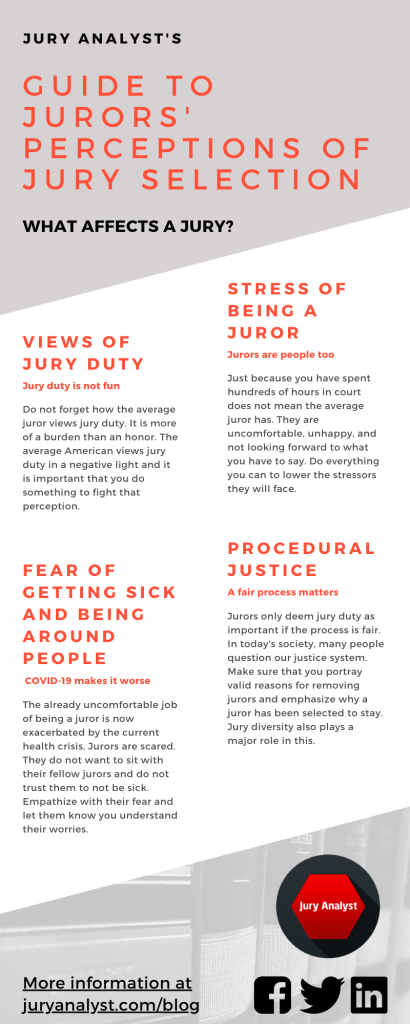Jurors’ Perceptions of the Jury Selection Process and Why It Matters

The most experienced attorneys know that jury selection can make or break your case. It does not matter how much you prepare for the trial or how great your evidence may be, you can still lose a case simply because a single juror manipulated the rest of the jury. Jury Analyst has previously written an article on how important voir dire questions are, however, the voir dire questioning is only one aspect of the process. There are other facets to consider during jury selection that can make a major difference in its results. A more underlying and less obvious aspect of jury selection that is often overlooked is the perceptions that jurors have about the process and how you can alleviate concerns or minimize unfavorable perceptions.
The jury selection process can differ between states and even jurisdictions, but the foundation stays the same. For example, not every jurisdiction has the opportunity to use in-depth supplemental juror questionnaires or even detailed voir dire questioning. At a minimum, courts in the United States must allow attorneys to question the jurors to enable them to measure whether the jury can be fair and impartial. This questioning process is extremely uncomfortable for jurors. They are asked to come into a strict courtroom environment, sit around strangers, and answer questions from both the plaintiff and defense attorneys who are both trying to decipher these potential jurors’ beliefs and values with intrusive questions. This process will never be pleasant for the jurors but it is important to be aware of how these jurors generally perceive the process.
It has been proven that humans do not make good decisions while stressed. This is seen when students have severe test anxiety and fail even the simplest of questions due to sheer worry and overthinking. It can also be seen in both police officers and soldiers who make rash decisions in stressful environments that result in dangerous and even deadly results. The same is true for jurors in courtroom settings. Stress is only one factor. Emotions, comfortability, and perceived fairness also play major roles. If these things are not controlled, or at least recognized, they can wreak havoc on your case and its potential outcome.
What Affects Juror’s Perceptions?
It is important to view jurors as people rather than simply jurors or “tools” to win your case. They are normal people; Americans who are trying to participate in a required duty. They have emotions, they have faults, and they also have opinions and potential biases. Below is a list of things to remember when selecting a jury.

Views of Jury Duty
Jury service is not only a duty of citizens of our country, it is also a right protected by our constitution. The right of each eligible citizen to be considered for jury service helps preserve the right of each of us to face an impartial jury representative of our community. That being said, most Americans dislike jury duty. They may not want to be a juror or are unhappy that they were summoned for jury duty at all. They may have other priorities that far outweigh the time spent participating as a juror. It may seem like a waste of time to them. You must empathize with them by stating you yourself are eligible to be a juror and that you understand the inconvenience it can be. You need to be sure these potential jurors understand the importance of jury duty and that it is a right and a responsibility as an American citizen. Prove to them that this court case is not just a money grab or frivolous but instead has meaning and a very important purpose.
The Stress of Being a Juror
It is important to humanize them and realize the strain that jury duty can have on the average person. They do not spend much time, if any, in court so the environment is scary and unknown. The attorneys can often be intimidating and use complex legal jargon and words that can make it difficult for many jurors to voice their opinion. A study in 2002 found that the two most stressful aspects of being a juror are understanding the complexity of the trial and making the final decision in the case. Explain to the potential jurors that this is not going to be an easily understood case but that you will do your best to lay out all the details to the best of your ability. It is imperative to tell them that they must do their best in understanding all the details in the case but that they are not alone in their decision and that their fellow jurors can help fill in details they may have missed or failed to understand. Make sure they understand not only the importance of being a juror but also the importance of being honest and being fair. Tell them that their result in this legal case is important and can have a major impact on people’s lives, but in the end, the only thing that matters is that they leave the court feeling as though justice was served.
Procedural Justice
Procedural justice is a juror’s perception that the processes of jury duty and jury selection are fair. In psychological research, procedural justice has been found to be one of the most predictive variables for job performance and decision making. In the context of juries, this variable should be equally robust and play a major role in juror performance as well as decision making. Basically, juries need to feel that they were chosen for good reason and that the process by which they were either chosen or removed was fair. Jury diversity can be a major component of this. If there is only one minority juror from a jurisdiction that has a diverse population, they will likely have low procedural justice and view the process as being unfair. It is important for jurors to view the composition of the jury as representative as well as their selection being a fair one. Peremptory challenges during jury selection likely have a troublesome effect on jurors’ views on procedural fairness. Be careful removing jurors with little or no reason because other jurors may be negatively influenced by these decisions.
Fear of Getting Sick and Being Around People
Six months ago, this was not a problem. No one really worried they would get sick from jury duty or feared being around strangers, but things have drastically changed in the last six months. Jurors are now scared of each other. They do not want to be within six feet of people they do not know and are afraid for their lives. Covid-19 has led to some jury selection and voir dire changes that make this less of a problem. Many jurisdictions are doing virtual jury selection and allowing supplemental jury questionnaires to be sent out early in hopes of lowering the number of jurors that are actually needed in the courtroom. The courts have also spaced out the jurors throughout courtrooms and even conference centers. They have installed plexiglass between jurors and are forcing them to wear masks. Even with all of these precautions, it is of the utmost importance to remember that the already uncomfortable role of a juror is now even more uncomfortable. These people have not been around strangers for long periods of time for nearly six months. Things are not normal. But, you as the attorney need to reassure them that things are beginning to go back to normal. Restate that these precautions are in place to protect everyone while ensuring that people get their right to a trial. Admit that you are not comfortable yourself in this new environment but let them know that things must continue, our foundational procedures cannot simply stop.
Final Thoughts
At Jury Analyst, we can help you with the development of your supplemental juror questionnaire to reduce the stress of jury selection on potential jurors and to help in the discovery of voir dire themes to help select the best possible jurors. However, it is important to remember that the supplemental juror questionnaires and voir dire questions only get you so far. You need to make sure that you control the perceptions that the jury has of the jury selection process and of jury duty itself. View the jurors as humans who are not exactly happy to be serving on a jury. Remember the entire process is uncomfortable and stressful and that COVID-19 only makes it worse. Let them know that you understand how they feel and empathize with the problems they have with the process. Doing these things will not only increase your jury’s perceptions of the jury selection process but also of you, the plaintiff’s attorney, as someone who cares how they feel and wants them to be comfortable and stress-free during their jury duty.
